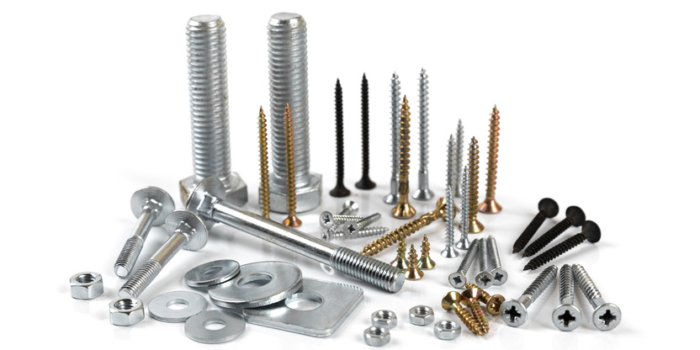
American industry has never been so powerful. With products being churned out at impossibly high levels on a daily basis, there’s one thing that holds them all together — literally. The fastener industry is the industry that fuels many others. Let’s take a closer look at three common types of fasteners and their uses.
Check out our EZ Screw Builder to build your custom screw!
- Screws: Screws offer more holding power than nails due to their threads — they can easily grab onto the material they’re being drilled into. As a result, screws should be used when your project demands more strength. Though screws are the most common type of fastener and can be used with a variety of materials, they are preferred in woodworking and light-to-medium construction. However, they have a limit; they are not recommended for heavy-duty construction where the fasteners would be under significant load. Fun fact: before 1928, screws were handmade and no two were ever alike — imagine constructing a project using screws of all different shapes and sizes!
- Bolts: Any project that experiences serious weight stress (such as when large pieces of lumber are involved) requires an increased strength and security of the bolts. They are much larger so they’re able to fasten larger materials together, and the companion nut allows you to create a tighter bond. Bolts are favored for heavy-duty construction as a result of this strength: anything that needs to support the weight of a human (or several), from a porch to an office building, relies on bolts to get the job done.
- Nails: Nails are favored in light construction — think roof shingles, door and window trim, or framing. Since these projects don’t require a lot of holding power, their fasteners don’t need to provide it. As a result, less energy and effort is needed to drive a nail into a material. Nails may not be stronger than screws, but they are a little bit more forgiving; they can bend a bit without immediately breaking, whereas a screw subjected to the same amount of force would likely snap.
The fascinating thing about fasteners is that their application is potentially limitless; as technology becomes smaller, so to do the custom screws. In fact, the future seems to be moving in a customizable direction: customizable screws, custom shoulder bolts, and micro fasteners are available for whatever industry may have use of them. Now that you know more about screws, bolts, and nails, what will your customizable screw project entail?
Related Articles
When it comes to product design, every detail matters. From the choice of materials to the manufacturing process, every decision can significantly impact the functionality, durability, and aesthetics of a...
Spending $1500-$3000 on a custom screws may seem excessive to some, but for designers and engineers who are passionate about their craft, it can be a necessary expense to solve...
Tamper proof screws are an important security feature for many industries, including electronics manufacturing, aerospace, and government. They are designed to prevent unauthorized access to sensitive equipment, products, or areas...

